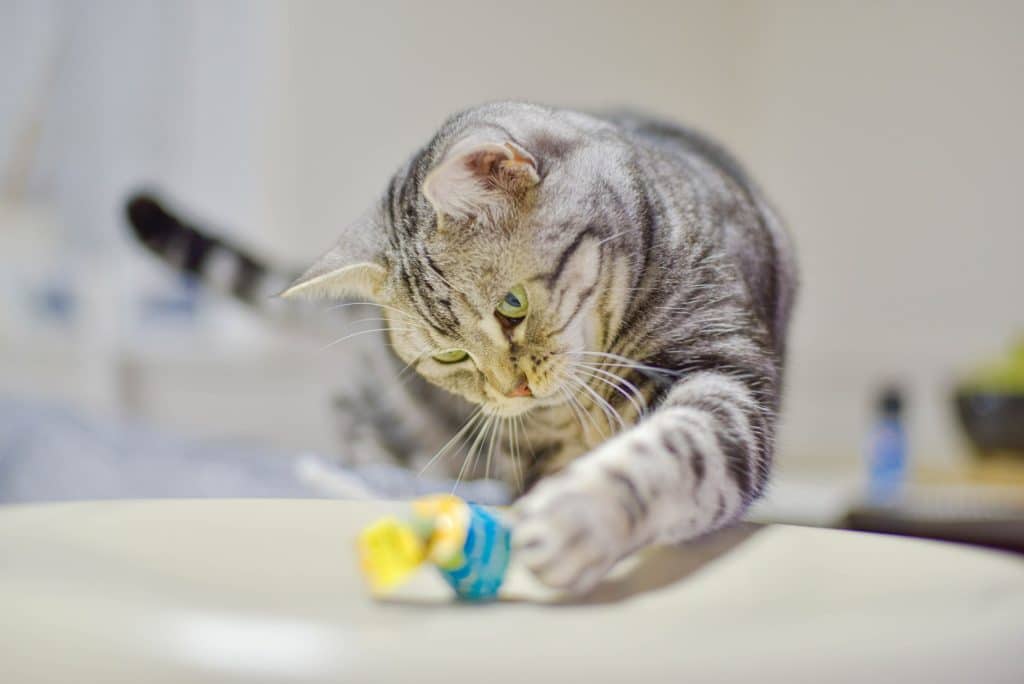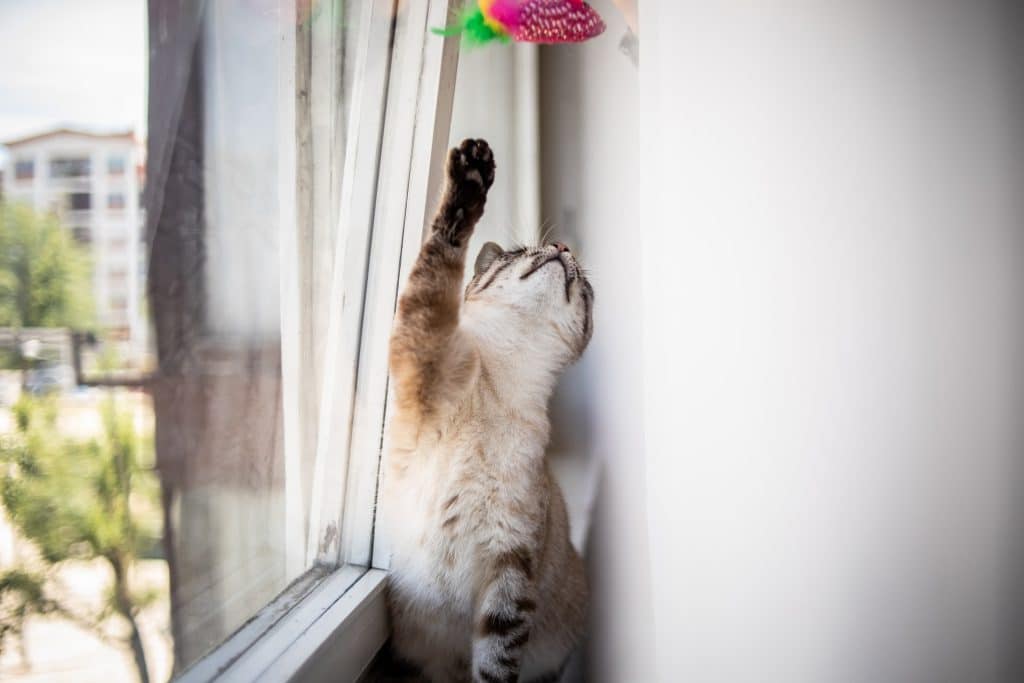- Not a substitute for professional veterinary help.
Our feline friends demonstrate plenty of quirky behaviors — from squeezing into boxes half their size or drinking from the faucet rather than their bowl. However, some cat behaviors, like jumping on counters or knocking things over, are less desirable.
So what’s going on? Cats often knock things over because they want attention or to play with the item. While this behavior may be unwanted, it’s normal and nothing to be concerned about. “It’s common for cats to investigate their environment and to move things with their paws,” says Mikel Delgado, cat behavior expert and consultant at Feline Minds. But if it’s becoming problematic (and you’re worried something expensive will fall), you can stop your cat from knocking things over by providing enough enrichment, cat-proofing your home, and ensuring their toys suit their primal need to hunt.
Learn more about why your curious cat loves to knock things over and how to stop them — your cat might even be knocking something over right now!
5 Reasons Cats Knock Things Over
We’ve all fallen victim to our cats knocking something over, worrying that whatever they’ve batted over broke. If you’re wondering why cats love to do this, there are various explanations, including the following.

iStock/ramustagram
Your cat is following their instincts
While domestication has caused cats to adopt new behaviors, they’ve retained many innate instincts, including the drive to hunt. So although your mug or lamp might not resemble a mouse or bird, they still act as targets for your feline to hone in on and attack.
“Some items might even feel prey-like when touched with a paw, which may stimulate play or hunting behavior,” Delgado explains. “Their paw [pads] are very sensitive, and touching objects is one way they can gather information about them.”
This hunting instinct could also explain why your cat knocks things over at night, as cats naturally like to roam and catch prey in the twilight hours.
Your cat wants to play
Playtime is a fantastic way for your cat to feel physically and mentally stimulated. “Cats require daily opportunities to play,” says Molly DeVoss, a certified feline training and behavior specialist (CFTBS) and the founder of Cat Behavior Solutions.
She adds that play often simulates hunting, so cats like to chase and play with string and feather toys.
Your cat is asking for attention
As children act out when they want to grab your attention, so can cats. Delgado says cats are super bright and learn quickly that their behaviors lead to what they want!
Think about how you reacted last time your cat knocked something over. We bet you ran straight over to them! “If every time your cat tries to bat something off a table, you immediately look at them or run over, they can figure out that this is a great way to get your attention,” she notes.

iStock/Olha-Tsiplyar
Your cat is bored
Out in the wild, cats are constantly on the move, and there’s lots to see and hear. But, in the comfort of a human home, there isn’t the same level of stimulation.
“Cats are naturally very active for many hours throughout the day,” DeVoss shares. “[In homes] they often lack the minimum mental stimulation and opportunity to simulate the hunting sequence they need.”
This, in turn, prompts them to get creative. DeVoss adds that bored cats knock things over to see what will happen and assess if the item moves or if they can chase it.
Your cat finds it fun
Humans often do things because they find them fun even if, to others around them, these might not seem so amusing. The same applies to cats, especially when they knock things over — it’s entertaining!
“For some cats, moving items around or knocking them off a table is fun,” Delgado notes. “It will feel similar to some experiences they might have when hunting.”
How Do I Stop My Cat From Knocking Things Over?
Even if you’re frustrated by your cat knocking things over, never punish or scold them. Doing so can cause your cat to become stressed and anxious and potentially turn to more aggressive behaviors. In addition, negative tones and actions can damage the important bond between you and your cat.
Instead, it’s best to redirect the behavior to a more appropriate place. Here are some cat behaviorist-approved tactics to try.
1. Enrich their space with plenty of toys & activities
Bored cats are dangerous for your precious items. Offering your cat suitable toys to be knocked and batted around will ensure their play and hunting instincts are fulfilled, and they’ll leave your things alone. Then they won’t feel the need to go after your precious items! Delgado adds that a good variety of toys is essential and should be rotated often. DeVoss cautions pet parents to rotate their cat’s toys at least every week.
Cats get quickly bored with toys,” she says. “When [they’re] interesting, a cat will engage with them. But when they’re not, the cat is going to seek other interaction through attention-seeking behaviors.”
DeVoss says to be mindful and put away smaller toys after playtime so your cat doesn’t get tired of them.
Besides toys, there are many other outlets to prevent boredom and allow your cat to engage in hunting behaviors. Scratching posts and mats, tunnels, climbing towers, baskets, and boxes are all easy home additions cat feline will love.
2. Schedule more playtime
“Cats need multiple prey play sessions each day,” DeVoss asserts. This type of playtime is crucial because it mimics hunting and fulfills your cat’s primal needs.
Rather than giving your cat some toys and leaving them to their own devices, get involved yourself. “To reinforce the simulation, give your cat a treat after the ‘kill bite’ to replicate the consumption part of the [preying] process,” she recommends. “I like to use Vitakraft PurrSticks because you can break them into smaller pieces and toss them to the cat.”

iStock/Milan Markovic
3. Cat-proof your home
Have some items that you *really* don’t want knocked over? You can store them away, place them where you can still see them but your cat can’t reach them (e.g., in a glass cabinet), or make them more cat-proof. Other effective cat-proofing methods include covering your couches to prevent stains and spills and purchasing pet gates to prevent your feline’s access to areas where you have valuables.
Additionally, Delgado loves using museum putty to secure valuables she doesn’t want her cat to knock over.
4. Utilize positive reinforcement
Training exercises are a great way to bond and have fun with your cat while encouraging them to engage in more desirable behaviors. Delgado recommends using reward training to teach your cat less-destructive behaviors, such as giving you a high five or sitting on a mat!
5. Invest in a puzzle feeder
Puzzle feeders are a great way to mentally stimulate your cat, with research suggesting they aid in reducing aggression, stress, and attention-seeking behaviors (like knocking things over!). DeVoss recommends leaving several feeders around the home for your cat to hunt out of, particularly if you’re away from home.
6. Create a catio space
Perfect for your indoor cat, a ‘catio‘ is a great way to let your cat enjoy the outside world without them wandering off. DeVoss says catios “give your cat an opportunity to watch prey in their natural setting, yet maintain their safety.”



